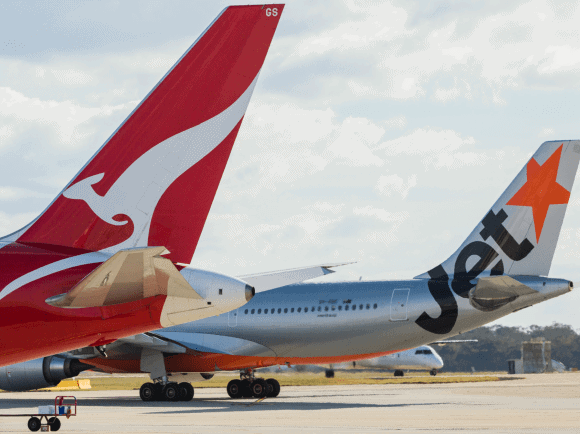Qantas Group Cuts More Flights in Response to Coronavirus
 Qantas and Jetstar will reduce services to Asia until at least the end of May, as the Qantas Group grapples with weak demand caused by the coronavirus outbreak. As a flow-effect, Qantas and Jetstar will also cut trans-Tasman flights to New Zealand and domestic flights within Australia until the end of June 2020. The announcement comes as Qantas reveals its financial results of the first half of this financial year.
Qantas and Jetstar will reduce services to Asia until at least the end of May, as the Qantas Group grapples with weak demand caused by the coronavirus outbreak. As a flow-effect, Qantas and Jetstar will also cut trans-Tasman flights to New Zealand and domestic flights within Australia until the end of June 2020. The announcement comes as Qantas reveals its financial results of the first half of this financial year.
In addition, Qantas flights QF35 & QF36 between Melbourne and Singapore will be downgraded from daily Airbus A380 services to Boeing 787 services until at least the end of May 2020. This will result in a massive reduction in the number of seats offered on each flight, as well as the loss of First Class on the route.
The following Qantas international routes are affected by the service reductions:
- QF129/130 (Sydney-Shanghai) – route suspension extended to at least the end of May 2020
- QF127/128 (Sydney-Hong Kong) – all flights cancelled in April and May (QF117/118 still operates, meaning overall Sydney-Hong Kong service goes from 2x daily to 1x daily)
- QF97/98 (Brisbane-Hong Kong) – frequency reduced from daily to 4x weekly
- QF29/30 (Melbourne-Hong Kong) – frequency reduced from daily to 5x weekly
- QF35/36 (Melbourne-Singapore) – aircraft downgraded from A380 to Boeing 787
Some Qantas flights between Sydney-Auckland, Melbourne-Auckland and Brisbane-Christchurch will also be cancelled.
The following Jetstar international routes are affected by the service reductions:
- JQ11/12 (Gold Coast-Narita) – frequency reduced
- JQ25/26 (Cairns-Narita) – frequency reduced
- JQ15/16 (Cairns-Osaka) – frequency reduced
- JQ17/18 (Melbourne-Phuket) – frequency reduced
- JQ27/28 (Sydney-Phuket) – frequency reduced
Jetstar’s Asia-based airlines (Jetstar Japan, Singapore-based Jetstar Asia, and Vietnam-based Jetstar Pacific) have also suspended all flights to mainland China. And Jetstar will cut trans-Tasman flying by around 5% over the coming months.
Qantas and Jetstar customers with affected bookings will be contacted directly and offered alternatives. For domestic bookings, customers will be able to change to an earlier or later flight on the same day. For international bookings, options will be provided a day earlier or later, or on the same day with a connection via another Australian city.
Cathay Pacific has also cut services between Australia and Hong Kong until at least the end of March. Singapore Airlines too has reduced frequencies to Australia until the end of May.
Qantas releases a Double Status Credits offer
These service reductions are designed to decrease the financial impact to Qantas of the current weak travel demand. But Qantas is also attempting to stimulate demand.
One way it is doing this is via the current Double Status Credits offer, which is valid on all Qantas flights for travel until 14 February 2021.
Qantas Group half-yearly financial results
The announcement was made yesterday as Qantas revealed its half-yearly financial results. Although the result wasn’t quite as good as last year’s, underlying profit for the first half of the 2019-20 financial year was $771 million. That is a strong result given current economic conditions.
Qantas says that it estimates the financial impact of the coronavirus outbreak – and subsequent impact on demand and travel bans – could be around $100-150 million in the current financial year.
Jetstar industrial action
Jetstar delivered another strong result for the Qantas Group, with even more growth in ancillary revenue. But Qantas CEO Alan Joyce says that this came despite Jetstar’s pilots taking industrial action just before Christmas.
In yesterday’s speech, Joyce took the opportunity to re-affirm his hardline position on not giving in to the demands of Jetstar pilots.
“Let me pause at this point to say that our position on wages is crystal clear. We’re offering 3 per cent a year, which is above inflation and above what most companies are offering,” Joyce said.
Qantas is also very close to making an announcement on Project Sunrise, despite no agreement being made yet between the company and its pilots. Last week, Qantas announced that it would hire cheaper pilots on new contracts if its current pilot base did not give in to the airline’s demands.
Qantas Loyalty increases profit
The Qantas Frequent Flyer program is consistently one of the most profitable divisions of the airline, and this year is no exception. Qantas Loyalty experienced a 12% increase in earnings, which Qantas CEO Alan Joyce said was mainly a result of the program changes announced in June 2019.
“Overhauling the Frequent Flyer program had the biggest impact – because of how well the members responded. This was a $25 million investment and included 1 million more reward seats. We also cut fees,” Joyce said.
One of the key announcements made last June was the launch of a new “Qantas Points Club”, which Qantas said at the time would increase revenue and program engagement. This club was supposed to launch by the end of 2019, but Qantas still says that it’s “coming soon”.
Join the discussion on the Australian Frequent Flyer forum: Qantas Group Reducing services by effectively grounding 18 Aircraft due to Coronavirus
